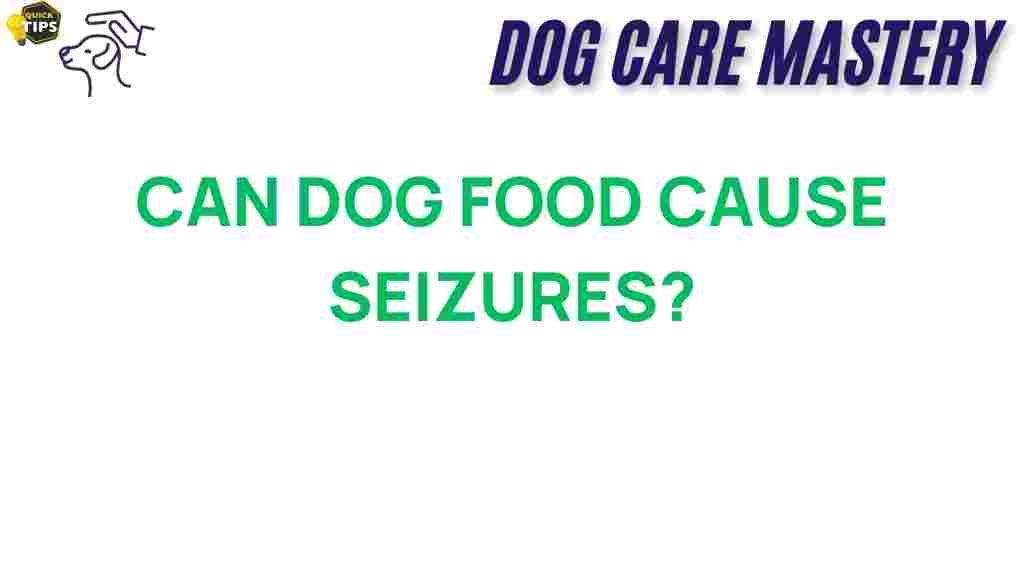Can Dog Food Cause Seizures?
As a responsible dog owner, ensuring your furry friend remains healthy and happy is your top priority. However, many pet owners may not realize that the type of dog food they choose can have significant effects on their pet’s health. Among the myriad of health concerns associated with dog food, one alarming issue is the potential for seizures. In this article, we will explore the hidden dangers of dog food, focusing on how it can potentially lead to seizures in dogs, and what you can do to mitigate these risks.
Understanding Seizures in Dogs
Before diving into the connection between dog food and seizures, it’s essential to understand what seizures are and how they manifest in dogs. Seizures occur when there is an abnormal electrical discharge in the brain, leading to various symptoms, including:
- Uncontrollable shaking or twitching
- Loss of consciousness
- Stiffening of the body
- Involuntary urination or defecation
- Postictal state (confusion or disorientation after the seizure)
Seizures can be caused by various factors, including genetic predispositions, health conditions, and environmental triggers. However, the type of dog food you feed your pet can also play a significant role.
The Link Between Dog Food and Seizures
While not all dog food is created equal, some brands or formulations can contain ingredients that may trigger seizures in susceptible dogs. Here are some key factors to consider:
1. Ingredient Quality
Low-quality ingredients can lead to nutritional deficiencies or imbalances, which may contribute to seizure activity. Poor-quality dog food often contains:
- Artificial preservatives and colors
- Low-grade meat by-products
- Fillers like corn and soy
Opting for premium or holistic dog food brands that prioritize whole, natural ingredients can help reduce the risk of nutritional issues that may lead to seizures.
2. Allergens and Sensitivities
Some dogs have food allergies or sensitivities that can trigger seizures. Common allergens include:
- Wheat
- Dairy
- Beef
- Poultry
If you suspect your dog has a food allergy, consider switching to a limited-ingredient dog food or hypoallergenic diet under the guidance of your veterinarian.
3. Additives and Preservatives
Certain additives and preservatives in dog food have been linked to neurological issues, including seizures. Ingredients like BHA, BHT, and ethoxyquin are controversial and should be avoided. Always check the ingredient list and choose brands that do not use these harmful additives.
Step-by-Step Process: How to Choose the Right Dog Food
Choosing the right dog food can significantly impact your dog’s health and seizure risk. Here’s a step-by-step guide:
Step 1: Consult Your Veterinarian
Before making any changes to your dog’s diet, consult with your veterinarian. They can help identify any specific health concerns and recommend suitable brands and formulations.
Step 2: Research Dog Food Brands
Look for reputable brands that prioritize high-quality ingredients. Websites like the Dog Food Advisor can provide valuable insights and reviews on various dog food products.
Step 3: Read the Ingredient Label
Always read the ingredient list. Aim for foods that list a high-quality protein source as the first ingredient and avoid foods with vague terms like “meat by-products.”
Step 4: Monitor Your Dog’s Reaction
When introducing a new dog food, do so gradually over a week. Monitor your dog’s behavior, coat condition, and overall health during this transition. If you notice any negative changes, consult your veterinarian immediately.
Troubleshooting Tips for Dogs with Seizures
If your dog is experiencing seizures, it’s crucial to act promptly. Here are some troubleshooting tips:
1. Keep a Seizure Diary
Document each seizure episode, noting the time, duration, and any preceding events. This information can help your veterinarian identify potential triggers or patterns.
2. Avoid Stressful Environments
Stress can exacerbate seizures. Create a calm environment for your dog, minimizing loud noises and sudden changes in routine.
3. Regular Vet Check-ups
Frequent veterinary visits can help monitor your dog’s health and adjust medications or dietary plans as necessary.
4. Consider Nutritional Supplements
Some nutritional supplements, such as Omega-3 fatty acids, have been shown to support brain health and may reduce seizure frequency. Consult your veterinarian before starting any supplements.
Other Considerations
Besides dog food, several other factors can contribute to seizures in dogs. These include:
- Genetic predisposition (certain breeds are more prone)
- Underlying health conditions (like liver disease or infections)
- Exposure to toxins (such as certain plants or chemicals)
Being aware of these factors can help you provide a safer environment for your dog and potentially reduce seizure episodes.
Conclusion
The connection between dog food and seizures is an essential topic that every dog owner should be aware of. While there is no one-size-fits-all answer, choosing high-quality, nutritious dog food free from harmful additives and allergens can significantly impact your dog’s health and well-being. Regular veterinary consultations and a proactive approach to your dog’s diet can help you uncover hidden dangers and ensure that your beloved pet remains seizure-free. By taking these steps, you can contribute to a happier, healthier life for your furry companion.
For more tips on pet health and nutrition, visit our Pet Health Resource Center for reliable information and expert advice.
This article is in the category Health and created by dogcaremastery Team
